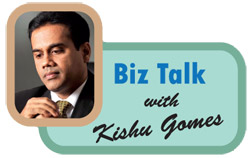|

Twenty first century leaders develop traits over skills
Today our world is filled with sceptics. People are simply jaded, and
why shouldn't they be? Over the past 50 years we've lived through
disgraced world leaders, dubious armed conflicts, pilfered pensions and
'new and improved' products that are clearly neither new nor improved.
We live in a world where much of what comes to us from organisations,
is spin, propaganda, and distorted half-truths.
It should be obvious to any 21st century leader that many people are
reluctant to believe anything.
What we long for is authenticity. We want leaders who speak plainly
and from the heart. We want bosses who reject corporate mumbo jumbo. We
want professionals who don't cloak themselves in a blanket of
buzz-speak. Growth leaders are distinctive not only in their actions,
but also in their attributes.
These specific attributes are more like personality traits than true
management skills, and they ultimately build trust.
The obvious has no place in the world any more
Facing reality isn't merely a good idea; it's a leadership
imperative. Your organisation depends on someone to challenge the
organisation's most closely held beliefs today. 'Our product is the
best.' 'Our team is superior.' 'Our customers love us.' 'Our cause is
more important than any other.'
Really? Let's drop the empty slogans, take down the banners, and
throwaway the T-shirts. Today, it takes a pragmatic realist to separate
the true picture from conventional group think. Look for innovative ways
of proving yourself in the eyes of your customers. For most growth
leaders this type of skill comes naturally. Others need to regularly
extricate themselves from day-to-day activities to work on leadership
skills. Either way, being sensitive is a skill that gives leaders
another arrow in their organisational growth.
Foster transparency - honesty comes with transparency
Most of the great corporate and political scandals of the modern age
have had more to do with cover-ups than with the original act of
wrongdoing itself. In contrast, people and organisations that are
transparent in their actions are the ones that consistently grow and
come out ahead in the long run. Those who are forthcoming with
information, good and bad, can lead a team more effectively to
accomplish great things.
An organisation can and should be transparent, but to be so, it needs
leaders who are transparent in their actions.
Employees, customers, vendors, and shareholders know what to expect
from transparent leaders. Fostering transparency takes commitment and
confidence. It can be tempting to hide problems, but the transparent
leader knows that the truth eventually slips out and often looks worse
than it did originally. As an ancient Eastern adage says, "Three things
cannot be hidden forever: the sun, the moon, and the truth". To lead, it
is critical to master authenticity. Reject the tired clichés, lose the
latest buzzwords, and say what you mean and mean what you say. Know what
you do and do what you know and do it the right way. |


